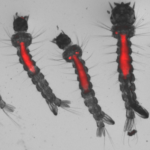Link to Pubmed [PMID] – 32825534
Link to DOI – E67910.3390/pathogens9090679
Pathogens 2020 Aug; 9(9):
The mosquito microbiota reduces the vector competence of Anopheles to Plasmodium and affects host fitness; it is therefore considered as a potential target to reduce malaria transmission. While immune induction, secretion of antimicrobials and metabolic competition are three typical mechanisms of microbiota-mediated protection against invasive pathogens in mammals, the involvement of metabolic competition or mutualism in mosquito-microbiota and microbiota-Plasmodium interactions has not been investigated. Here, we describe a metabolome analysis of the midgut of Anopheles coluzzii provided with a sugar-meal or a non-infectious blood-meal, under conventional or antibiotic-treated conditions. We observed that the antibiotic treatment affects the tricarboxylic acid cycle and nitrogen metabolism, notably resulting in decreased abundance of free amino acids. Linking our results with published data, we identified pathways which may participate in microbiota-Plasmodium interactions via metabolic interactions or immune modulation and thus would be interesting candidates for future functional studies.

